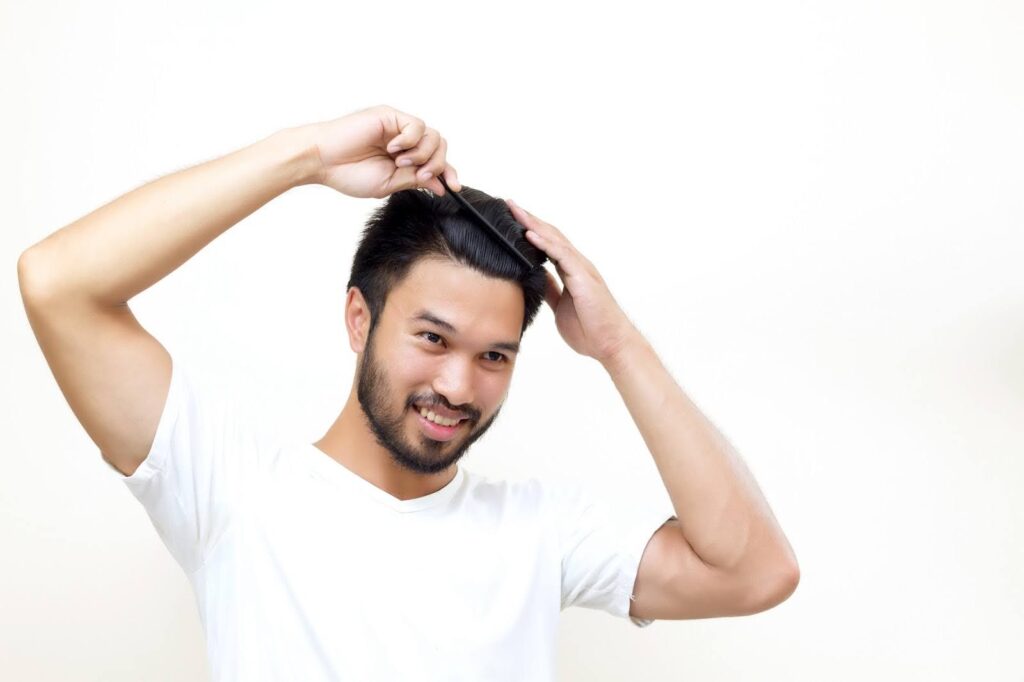Many men struggle with hair loss, which can cause distress and affect their confidence. It’s natural to look for reasons and solutions to eliminate the problem of unwanted hair loss. Nashville Hair Doctor helps men restore their natural hair with reliable solutions like the FUE hair transplant. Our Tennessee-based hair restoration center works with men from all over the country. We provide sound support and excellent results, earning a reputation as an effective, compassionate, and accessible FUE hair transplant center. In this article, we’ll explore the relationship between headwear and hair loss. We’ll answer the question, “Do hats and wigs cause hair loss?” and provide you with the information you need to make an informed decision about your hair.
Does Headwear Cause Balding?
Understanding the Relationship Between Hair Loss and Headwear
Hair loss is a common concern for many people, and we often receive questions like, “Does wearing a hat cause hair loss?” The answer is no: they do not directly cause hair loss. Hair loss is usually the result of one or more of the following factors:
- Genetics: Hereditary hair loss is the most common cause of hair loss in men. You may inherit the likelihood of baldness from one or both parents.
- Hormonal changes: Hormonal changes due to aging, testosterone levels, or thyroid problems can cause hair loss in men.
- Medical conditions: Medical conditions such as alopecia areata, scalp infections, or lupus can cause hair loss in men.
- Aging: Hair loss is a natural part of the aging process in men, and it usually starts with a receding hairline and thinning hair from the crown.
- Stress: Physical or emotional stress can cause temporary hair loss in men.
- Nutritional deficiencies: Lack of proper nutrition or certain vitamins and minerals can cause hair loss in men.
Correctly wearing hats and wigs will not speed up or worsen this natural process.
Common Misconceptions About Hair Thinning and Wearing Headwear
Wearing hats and wigs has long been a topic of concern regarding hair loss. We often get questions like, “Do wigs cause hair loss?” However, the belief that hats or wigs can lead to hair loss is nothing more than a myth. The truth is that hats and wigs made from breathable materials and worn loosely do not suffocate the scalp or cause hair loss. As we’ll discuss next, wearing hats can be beneficial in protecting your hair from harsh environmental factors such as sun exposure, which can damage it.
At Nashville Hair Doctor, we understand the importance of maintaining healthy hair. No matter the reason for your hair loss, there is hope found in the hair restoration options available. We focus on the FUE hair transplant procedure, which uses natural hair to regrow balding or thinning areas. Our NeoGraft® master technicians work closely with each client post-procedure to explain the best practices for headwear and other tips for a sustained recovery.
Hats and Wigs Can Help Protect Your Hair
As a matter of fact, hats and wigs can protect your hair from external stressors like the sun, wind, and pollution. Prolonged exposure to these elements can damage hair follicles and contribute to hair loss. Here are some of the actual benefits of wearing hats and wigs:
- They create a barrier that shields your scalp and hair from the sun, wind, and pollution, preserving hair health.
- They can prevent damage to your hair follicles, which can help reduce hair loss over time.
- Wigs can be a great option for individuals with hair loss or thinning, as they can provide a full and natural-looking head of hair.
For people wondering, “Does wearing a wig cause hair loss?” The answer is the opposite. Wear a hat or wig to protect your hair from external stressors or add a stylish accessory. These options can shield your hair and keep it safe while looking fashionable.
What Kinds of Hats and Wigs Are Most Beneficial?
When it comes to headwear for those with hair loss concerns, it’s important to choose the right materials that are comfortable and breathable. Here are some helpful tips to keep in mind:
- Opt for lightweight materials: Hats and wigs made from lightweight materials such as cotton, linen, or synthetic fibers can help minimize any discomfort from the headwear and prevent excessive sweating.
- Consider breathability: Look for headwear that allows air to flow through easily, which can help prevent irritation to the scalp and reduce the risk of fungal infections.
- Avoid tight headwear: Headwear that is too tight can restrict blood flow to the scalp, which can lead to headaches, hair breakage, and other issues. Instead, choose headwear that fits comfortably without being too snug.
- Choose hats with UPF protection: If you spend time outside, consider hats with UPF protection to shield your scalp from the sun’s harmful rays.
By following these tips, you can find headwear that is comfortable and safe for those with hair loss concerns.
When to Consider FUE Hair Transplantation
Hair loss can be a frustrating and distressing problem for many people. If you’ve been wearing hats to cover up your balding head and are now ready to have a full head of hair, the FUE hair transplant procedure is an excellent solution. FUE hair restoration is a procedure to extract hair follicles from a donor area and transplant them to the areas where hair loss has occurred.
Unlike traditional hair transplant methods, FUE doesn’t require the removal of a strip of scalp. This means that the scarring is minimal, the recovery time is shorter, and the results are more natural-looking. Moreover, FUE hair restoration has several benefits, including:
- High success rate
- Minimal downtime
- Improved self-confidence and self-esteem
- Restored hairline and youthful appearance
- Natural-looking results
- Minimal scarring
- Shorter recovery time compared to traditional methods
- Permanent results, as donor hair is resistant to balding
With a high success rate and permanent results, FUE is an excellent option for combating hair loss.
Help for Hair Loss at Nashville Hair Doctor
Unfortunately, hair loss is often a result of many factors that are beyond our control. Don’t get stuck thinking, “Do hats cause hair loss?” The reality is that the reasons for your hair loss are often more nuanced.
At Nashville Hair Doctor, we specialize in FUE hair transplantation. This reliable and advanced procedure can help restore your hairline and confidence. We provide free quotes and have a variety of before-and-after photos demonstrating our hair transplants’ effectiveness.
Don’t let hair loss hold you back. Nashville Hair Doctor is here to help you regain confidence and restore your natural hairline. With our expertise and experience, you can take the first step toward a fuller, healthier head of hair.

